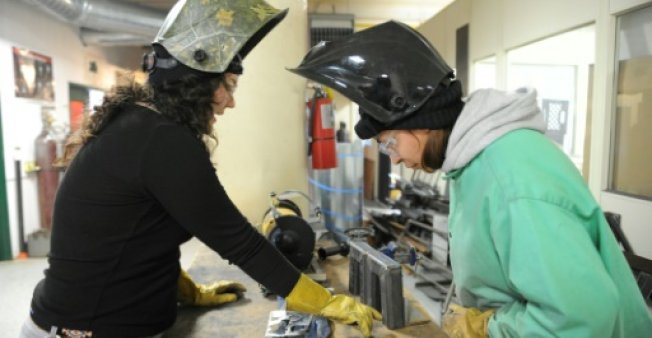
The #MeToo movement may be changing work cultures from entertainment to politics, but Guadalupe Hinojosa will still be stepping into a tough world for women when she completes her training as a welder.
On the third floor of a sprawling red-brick building in Chicago, where mason jars were once manufactured, the 35-year-old moved in a welding helmet between pieces of heavy industrial equipment.
A few weeks into her training at Chicago Women in Trades — an organization that prepares women for construction jobs — the single mother of four and survivor of domestic abuse hopes to land a job that could double her current income.
But that job will come with hardships. What awaits Hinojosa is a male-dominated work environment where women are often treated with outright hostility.
“I already am familiar with… the possibility of what I could be facing,” Hinojosa said. “I’ve just kind of been putting the armor on, trying to prepare myself for the worst.”
On construction sites and in manufacturing plants, blue-collar working women have endured harassment and abuse for decades.
Hinojosa’s teacher Scarlet Burmeister believes all of her students “will face some sort of harassment or gender based discrimination on the job.”
“A lot of them will be the first woman on the shop floor. A lot of them will get stared at and call names, and some of them will end up losing their jobs,” Burmeister told AFP.
As the #MeToo movement against sexual harassment has toppled powerful men in high-profile industries — from movies and media to fashion, the arts and politics — many blue-collar women have remained silent, afraid of destroying careers on which they heavily depend.
Others have spoken out with varying degrees of success.
But the wave has raised cautious hopes for change, said Jayne Vellinga, head of Chicago Women in Trades.
“For them to be getting wider attention for these issues that they live with every day… is heartening and makes people hopeful,” she told AFP.
– ‘He scared me’ –
For one female electrician, who asked that her identity be kept secret, harassment on a skyscraper construction site lasted for months.
It began as inappropriate flirtations from a male co-worker and escalated into angry, threatening behavior.
“I would turn around and there he is, for no reason,” the 26-year-old recounted to AFP. “I didn’t want to be near him, because he scared me.”
She was hesitant to speak out, worried about being blacklisted as a problem employee.
“I waited months before I said anything,” she said. “I was waiting to get physically hurt so that it would be undeniable.”
Eventually, the woman did speak out, complaining to her supervisor who was sympathetic — but he did not know how to help, and allowed the perpetrator to keep working on the site.
The male co-worker’s threats escalated into physical violence in which he struck the woman on the head with a heavy tool bag and threatened her life. He was finally fired.
– ‘They flexed their power’ –
Women in construction are far from alone among American blue-collar workers in battling sexual harassment on the job.
In one of the most high-profile examples to come to light, the auto giant Ford is facing lawsuits from women who say they were afraid to show up to work at two assembly plants in Chicago.
Miyoshi Morris, one of three female workers suing the firm who testified at a Chicago city government hearing in February, said that male supervisors demanded sex for job security and advancement.
“They flexed their power, threatened my career and suggested if I wanted to continue to provide for my family, I had to engage in sexual acts or favors,” Morris said.
Christie Van said she was physically assaulted. A male coworker threw her against a window and groped her. Another showed her a photo of his penis.
When she complained, a supervisor said: “Loosen up… You want to see mine, too?”
Ford settled two class-action lawsuits 20 years ago over harassment at the very same Chicago assembly plants.
Back then, the company promised training programs to change the abusive culture.
Ford admitted last year that its efforts have fallen short.
“This has been a learning experience about how difficult it can be to root out bad behavior,” said Ford CEO Jim Hackett.
– ‘Not expecting any real change’ –
Abusive behavior on blue-collar work sites has been a known problem in the United States dating back to 1965.
That was the year President Lyndon B. Johnson signed an executive order requiring non-discrimination policies among government contractors, including those constructing government buildings.
The decree triggered a surge in women entering traditionally male-dominated professions, breaking down barriers.
“There were pickets. There were lawsuits,” says Vellinga, of Chicago Women in Trades.
And as construction crews and assembly plants diversified, harassment increased.
Blue-collar women have been trying to improve their conditions ever since.
Vicki O’Leary, a union organizer with Ironworkers International who is working to diversify its ranks, was optimistic that change was starting to happen.
The #MeToo movement “is having an impact,” she said. “The women ironworkers are sticking together.”
Vellinga echoed the view that “among trade women, there’s a lot of optimism” — but she says few expect to start feeling the #MeToo effect in the near future.
“We’re not expecting any real change in their own workplaces anytime soon,” she said.
